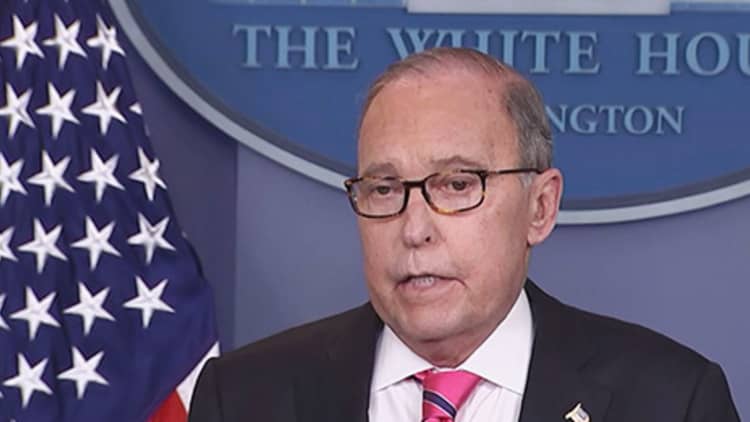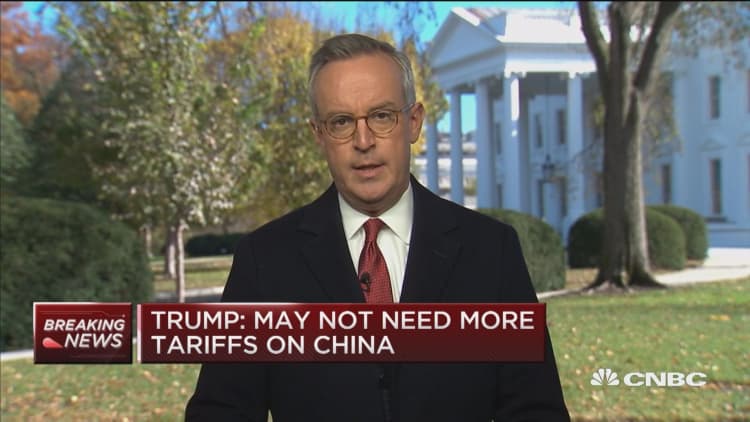
The Trump administration has restarted talks with the Chinese government "at all levels" ahead of a high-stakes meeting between President Donald Trump and Chinese President Xi Jinping this week, top White House economic advisor Larry Kudlow said Tuesday.
The heads of the world's two largest economies are set to meet on the sidelines of the G-20 summit in Argentina, where world leaders will convene on Friday and Saturday. Trump and Xi will talk trade as a mounting series of tariffs levied by Washington and Beijing contribute to concerns about slowing global economic growth. The two leaders will have dinner on Saturday.
Washington and Beijing have re-engaged about a path toward a trade agreement, and the summit offers "an opportunity to break through what has been disappointing discussions" in recent months, Kudlow told reporters on Tuesday. At the G-20, Trump will focus on issues including alleged Chinese theft of intellectual property, ownership of American companies in China and tariffs and non-tariff barriers, the National Economic Council director said.
"We're having now a lot of communication with the Chinese government at all levels," Kudlow said. "We were at a total standstill. Nothing was going on."
Since taking office, Trump has pushed China to address what he calls unfair trade practices and reduce its trade surplus with the United States. As part of his effort to force China to negotiate, the president has slapped tariffs on $250 billion in Chinese goods. The moves prompted retaliatory duties on U.S. goods that have hit certain American businesses, particularly in the agriculture industry.
In an interview with The Wall Street Journal on Monday, Trump said he plans to increase the tariffs on $200 billion in Chinese goods to 25 percent from 10 percent at the beginning of 2019, as planned. He again threatened to put duties on an additional $267 billion in Chinese goods if Washington and Beijing cannot reach a deal after the talks in Argentina.
Trump sees a "good possibility" that the U.S. and China can reach a deal at the dinner Saturday, Kudlow told reporters later Tuesday. Asked if more duties will harm the U.S. economy if the sides fail to reach a deal, Kudlow called the goods affected "a fraction of our economy" but noted there would be "winners and losers in that game." He contended that the U.S. is in "better shape to weather this than the Chinese are."
In his earlier comments, Kudlow said imposing additional tariffs is a "presidential decision" that Trump "will make following the talks." Beijing "ought to" take Trump seriously, as "the policies are not going away," Kudlow added.
"President Xi has the opportunity to change the tone and the substance of these talks. President Trump has indicated that he is open," Kudlow said. He contended that Beijing "must do more" to address U.S. concerns.

Trump's trade war with China has at times roiled stock markets this year amid concerns about broader damage to the U.S. economy. China was the largest U.S. trade partner through September, according to the U.S. Census Bureau.
On Monday, Trump also suggested he could put tariffs on Apple iPhones and laptops imported from China. He shrugged off the potential for higher consumer costs, saying "I can make it 10 percent and people could stand that very easily."
The president has repeatedly downplayed any concerns about tariffs harming the economy or consumers. His policy has sparked backlash not only from some American businesses, but also from bipartisan lawmakers who argue their constituents will suffer from the duties.
Trump has accused China of targeting agricultural products to hurt his supporters in the farming industry. In July, Trump said U.S. farmers are "patriots" who will end up "stronger" after his push for a new trade deal with Beijing.


